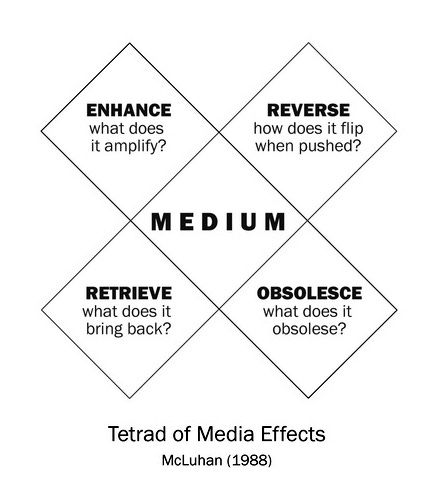This weekend the Times ran an opinion piece about the dangers of backup cameras. It was about more than that, obviously, but the gist of the genre is that all this new tech is lulling us into a sense of security that leaves us susceptible to over-reliance, and even forgetting entirely how to do things on our own.
Why is this interesting?
Because this is something we’ve been worried about forever (literally). In Phaedrus, Plato worried about roughly the same thing as it related to writing: “If men learn this, it will implant forgetfulness in their souls; they will cease to exercise memory because they rely on that which is written, calling things to remembrance no longer from within themselves, but by means of external marks. What you have discovered is a recipe not for memory, but for reminder.”
The reality is that all technology affects culture in expected and unexpected ways. “We shape our tools and thereafter our tools shape us” is one of my favorite aphorisms (misattributed to McLuhan). The irony, of course, is that the complaints in this article are perfectly expected. We come to rely on automation because it’s mostly better. In fact, the strangest part of the whole piece is the way the evidence of backup camera safety is presented. “Between 2008 and 2011,” the author writes, “the percentage of new cars sold with backup cameras doubled, but the backup fatality rate declined by less than a third while backup injuries dropped only 8 percent.” I think the implication is that those numbers aren’t all that impressive, but a 20 or 30 percent drop in backup fatalities seems pretty excellent to me.
Finally, the answers to articles like these almost always come back to the one rule of life: Things change. Technology hardly ever solves all the world’s problems or ruins society. Mostly what happens is it leaves us in a state of flux. We swing the pendulum one way and then we swing it the other. One properly attributed McLuhan-ism is the “Tetrad of Media Effects”. It lays out the four ways technology creates change:

The Times piece is effectively an explorations of McLuhan’s four effects. The backup camera enhances our senses by giving us eyes in the back of our heads, obsolescing the car’s mirrors, and retrieving a time when cars were smaller, but, as the article points out, when pushed to its extreme it reverses our own role as driver, giving control entirely over the tech. While the points are valid, we should be less surprised that this keeps happening and try to keep things in perspective. (NRB)
Tweet of the Day:
This Tweet from Kevin Slavin was fascinating. I followed up to ask if there’s an article or anything I could read on this, but he said he learned about it through conversations with folks involved. Definitely makes sense. (NRB)

Quick Links:
Speaking of articles about how technology is changing culture, I thought this Times article about how human contact is becoming a luxury item was much more interesting. “The wealthy can afford to opt out of having their data and their attention sold as a product. The poor and middle class don’t have the same kind of resources to make that happen.” (NRB)
Apple announced a bunch of stuff yesterday, including a News service and a TV thing (without a ton of details). But the most interesting thing (to me) was the credit card in partnership with Goldman Sachs and MasterCard. They’re doing 2% cash back on Apple Pay purchases and issuing a funky card with no numbers (those are in your Apple Wallet). Apple insider Jon Gruber was underwhelmed by the whole day. Nothing except News is out anytime soon, so it’s hard to say what matters and what doesn’t. Also, it seems like there’s some law of business here that once a company gets sufficiently large it eventually becomes a bank. (NRB)
Monocle writes a long piece on the Last Column, a project that focuses on the human cost of journalism. (CJN)
This story of a young woman’s airplane harassment is harrowing. (NRB)
The Gucci Screener is an $870 sneaker that looks forty years old and well-worn: “A pastiche of different influences that span across decades, the Cruise 2019 collection references old school shapes and materials inspired by vintage sportswear. Influenced by classic trainers from the '70s, the Screener sneakers—named for the defensive sports move—feature the Web stripe on the side and vintage Gucci logo, treated for an allover distressed effect.” (NRB)
Speaking of patina, this interview with the founder of Visvim is great. (CJN)
Thanks for reading,
Noah (NRB) & Colin (CJN)


